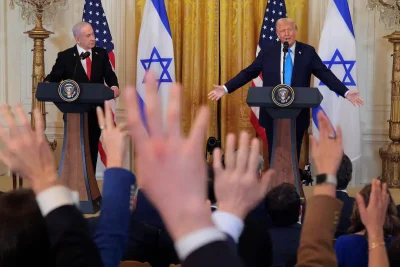King Donald’s courtiers struggle to keep up

But the most revealing lens through which to look at all this might not be Trump’s pronouncements but rather those of his aides and supporters.
The tariff tantrum suggested that foreign leaders are becoming skilled at handling Trump. They mollify him with token concessions, allow him to declare victory, and then return to business as usual. The “concessions” that Mexico and Canada made were either small-bore or policies they were already pursuing. Mexico agreed to send thousands of troops to the border at the Biden administration’s request — and is doing the same for Trump. In the case of Canada, Trump’s own statement on Truth Social notes that Canada was agreeing to “implement” its border plan (much of which had been announced in December).
Some conservative commentators pointed out the obvious. As the headline on a Wall Street Journal editorial put it, “Trump blinks.” Fox News anchor Laura Ingraham implied that the president caved to “a huge negative reaction” from markets, saying, “I’m not too impressed” with the concessions from Canada. Canadian media reactions were similar, with an author in Canada’s CTV News opining, “Canada takes a stand; and Donald Trump blinks.” The country’s satirical show “22 Minutes” has a Trump look-alike declaring, “I did the impossible. I made peace with Canada!” He then signs an executive order — “The I Did Not Lose But I Totally Won The Trade War Order.”
Of course, from JD Vance to Mike Johnson, Republicans fell over themselves to praise the president’s stunning negotiating powers. “The Trump Effect is in full force,” Johnson posted. “At this rate of achievement,” wrote Elon Musk, “not only should President @realDonaldTrump be on Mount Rushmore, I want to personally work the chisel!”
With the abrupt dismantling of the U.S. Agency for International Development, Trump’s supporters scrambled to adjust. Secretary of State Marco Rubio quickly blasted the agency, saying it was out of control and unresponsive. This was the same agency he had repeatedly posted in favor of over the years, written about in his book with pride and admiration, and recommended for funding increases to President Joe Biden.
The familiar pattern was followed after Trump’s Gaza announcement. Those who had long supported Trump’s determination to end America’s military interventions cheered when he announced that he would take over Gaza, send in troops if necessary, displace 2 million Palestinians to neighboring countries and stay in Gaza for “long-term ownership.” “President Trump is playing four-dimensional chess, you all are playing checkers,” Kayleigh McEnany said on Fox News. The same day as her commentary, Trump officials began walking back key aspects of the president’s plan, as has Trump himself. If you don’t understand, you haven’t played four-dimensional chess.
Trump’s White House is now a court, and his courtiers scurry around, aware that the mercurial monarch might change his mind at any time. “TikTok is terrible!” can suddenly become “TikTok is great!” — and they need to pivot quickly. It reminds one of the court of Henry VIII, who went from being the greatest defender of the Catholic Church to a vicious opponent because he wanted an annulment that the pope would not sanction. (One man who refused to play the game, Sir Thomas More, had his head chopped off.) The reason Trump forces aides and supporters to say things they know are false is to enforce a regime in which loyalty is paramount, overriding facts, overriding long-held convictions.
This might seem like an amusing spectacle, but there is a real cost. In the case of USAID, it will translate into death and despair for millions of the poorest people on the planet. On trade, it remains a mystery why Trump singled out Canada. In fiscal 2024, less than 10 percent of migrant encounters happened at the Canadian border, and just 0.2 percent of fentanyl seizures occurred there. America runs a smaller trade deficit with Canada than with China or Vietnam. In fact, if you put aside Canadian crude oil, the United States has a hefty trade surplus with Canada. But the effect is clear. For Canada, the United States is turning into an undependable ally, and it will try to lessen its reliance on America and search for new markets and friends, from Britain to China.
The largest effect, though, is on American democracy. Scholar Francis Fukuyama has noted that the history of modern government has been a steady movement away from “patrimonial” rule — the rule of a single strongman to benefit his family and friends — toward rule by institutions and rules and norms. He notes that in the United States, we are seeing the return to patrimonial rule as “citizens freely debating laws are replaced by supplicants begging the king to favor their interests.”

